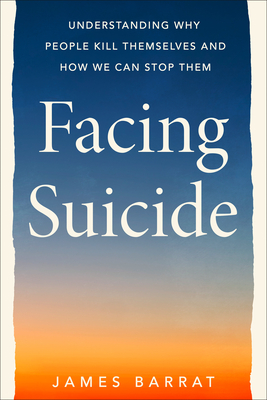
Barrat, James
product information
description
7A deep dive into a national catastrophe that examines how and why suicide happens so that we can prevent it Suicide has reached epidemic proportions in America, claiming over 45,000 lives each year--more than car accidents or homicides. For every person who dies there are about 10 unsuccessful attempts. Yet suicides are preventable, if we can grasp the complex factors behind it and look out for suicide's signs in our families, communities, and colleagues. In this groundbreaking book, acclaimed journalist James Barrat delivers these insights with a deep dive into America's suicide crisis. With profiles of survivors and their families, and interviews with experts, Barrat assembles a thorough, nuanced portrait of this confounding killer. He examines suicide's many risk factors, including genetics, substance abuse, access to lethal means, and mental health. Importantly, he explores how societal issues like racial trauma, bullying, and financial stress - in combination with other factors - can push people to kill themselves. Barrat reveals the structural and chemical differences found in suicidal brains, providing biological insights. Facing Suicide celebrates solutions. Barrat shows how the US Air Force and the nation of Denmark lowered suicide rates with comprehensive 'systems approaches' that enlist every member of society in impactful interventions. Importantly, Barrat finds that 100% of the people he interviewed who attempted suicide are happy they got help and are alive today. Their message is one of healing and hope. With deep reporting and keen insights, Facing Suicide sheds essential light on this painful, growing crises with actionable information about preventing suicides. Barrat's urgent book makes clear that understanding and preventing suicide must be a national priority. We all have a role to play in this vital effort.
member goods
No member items were found under this heading.
Return Policy
All sales are final
Shipping
No special shipping considerations available.
Shipping fees determined at checkout.






